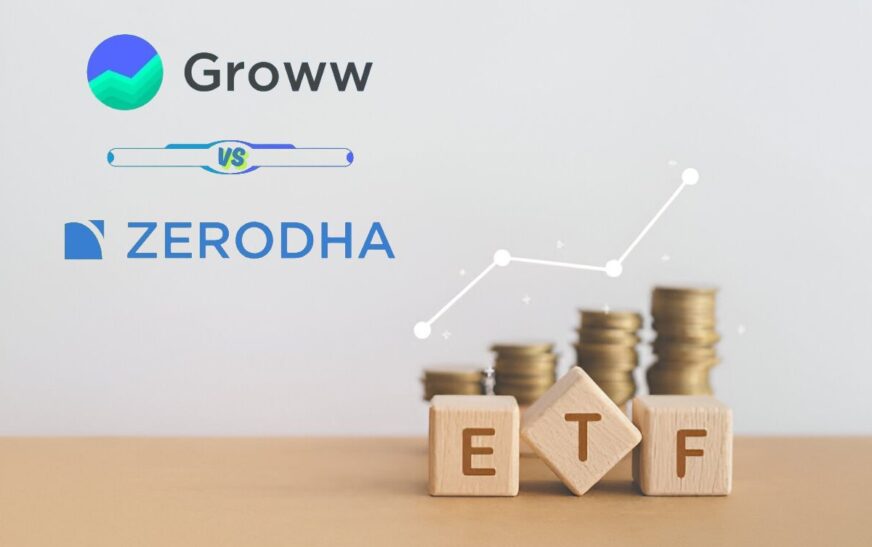The rapid rise of ETFs in India has shifted the attention of investors to the evolving roles of AMCs. Particularly, growing platforms like Groww and Zerodha are on the radar today. These two players are redefining the retail investing environment, offering cost-effective and transparent ETF solutions.
These ETFs are known for their low barriers to entry, ease of use, and innovations developed considering the priorities of investors. In this blog, we will comprehensively understand the ETF offerings from these two popular AMCs.
Background of the Brokerage Platforms
Let’s start with the backgrounds.
Groww
Groww is relatively new as a brokerage platform. Launched in 2017 as a mutual fund discovery platform, it later expanded to ETFs, stocks, and international investing. Its user base is dominated by young and tech-savvy investors.
It is known for simplifying investment through its digitized platforms and transparent execution. Today, investors can choose from over 15 Groww ETFs based on their financial goals.
Zerodha
Zerodha has been a part of the online brokerage industry since 2010. It pioneered the discount broking model in India. In terms of active accounts, it is presently the biggest brokerage in India, prioritizing low-cost trading and transparency.
Over time, the platform expanded its offerings to mutual funds and curated AMC selections. Its web platform is clutter-free, and the platform has developed a reputation for fast accessibility. However, the number of Zerodha ETF products is comparatively low.
Types of ETFs available on Groww and Zerodha
Investors can choose from a wide range of ETFs on both these AMC platforms. Some of the common categories of ETFs available with both these brokerages include:
- Gold ETFs
- Silver ETFs
- Nifty ETFs
Grows offers a higher number of sectoral ETFs like defense, railway, and power. Groww has also launched innovative funds like the Groww Nifty India Internet ETF, which targets futuristic sectors like technology and digital services.
On the other hand, Zerodha’s ETF lineup includes key indices, government securities, and sector-specific funds.
User Experience
Groww
Groww has gained popularity for its:
- Speed of opening accounts
- Mobile-first strategy
- Modern interface
- Different types of ETFs
Zerodha
Zerodha, on the other hand, is known for:
- Clutter-free web dashboards
- High-performing ETFs
- The Coin platform
Cost & Accessibility
On Groww, investors can access direct ETF and mutual fund plans. This eliminates the commissions for distributors and allows Indian investors to explore foreign ETFs. This provides you with exposure to the US and global markets.
Zerodha maintains negligible domestic trading costs and offers transparent fee structures. Investors benefit from fast fulfillment of their orders. Even small investors can participate without any barriers.
What Sets Them Apart
Now, check out the key strengths of both these platforms that appeal to investors.
Groww
- Resources available to educate investors, including videos, guides, and calculators
- The digital onboarding process is simple and follows a paperless KYC process
- Unique ETF products like the Nifty India Internet ETF provide exposure to growth-oriented sectors
Zerodha
- Zero Commission on direct mutual funds
- Wide range of ETFs and focus on crucial sectors
- Known for clean and jargon-free communication
Both these AMCs are known for their transparency and innovation, which benefits investors.
Conclusion
Investors today are keen to ride the ETF revolution in India, which is spearheaded by two of the most trusted platforms – Groww and Zerodha. The popular AMCs are driving retail adoption through their cost efficiency, transparency, and digital innovation.
Groww has a strong appeal to first-time investors with its easy onboarding process. Zerodha, on the other hand, continues to be a top platform for its legacy and trust.
Together, these platforms are empowering millions of Indians to participate in both local and global markets. Blending technology with compliance, these AMCs are shaping the future of investing in India.
Also Read: Why Innovation Needs Security: How Enterprise Learning Platforms Support Safe Growth




